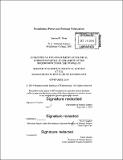Presidential power and partisan polarization
Author(s)
Hoar, Samuel R.
Download1144175883-MIT.pdf (16.41Mb)
Other Contributors
Massachusetts Institute of Technology. Department of Political Science.
Advisor
Devin Caughey.
Terms of use
Metadata
Show full item recordAbstract
Since the publication of the first edition of Richard Neustadt's Presidential Power in 1960 the two political parties in the United States have grown further and further apart ideologically, especially in the United States Congress. This essay evaluates how that polarization has fundamentally reshaped the opportunities for the president to influence the voting decisions of members of Congress. The first chapter lays out a basic framework for understanding the possibilities for presidential persuasion in the realm of congressional roll call voting, and offers a basic theory of how polarization has fundamentally changed the opportunities the president has to affect how members vote. Presidents who hold office in an era of partisan polarization have fewer instruments at their disposal to be able to change the incentives for members of the opposing party to vote for a particular piece of legislation, but far more tools that they can use to alter whether members of their own party believe that voting in the direction preferred by the president is in their best interest. The following three empirical chapters examine more closely three potential effects of the president taking a public stance on individual pieces of legislation on members' reelection goals. Chapter 2 tests whether respondents express differing levels of support for three individual pieces of legislation when they know where the president stands on those bills. I find that knowledge of the president's position on legislation appears to lead presidential copartisans to be somewhat more likely to adopt the president's position on the issue; similarly, opposing partisans appear somewhat more likely to move away from the position preferred by the president, although the effects do not quite reach the level of statistical significance for two of the three pieces of legislation. Chapter 3 turns to the effect of member loyalty to the president on primary election returns: do primary voters of the president's party reward members who are more loyal to the president? Despite endogeneity concerns that make this a particularly hard test for determining the effect of presidential loyalty (or disloyalty) on primary elections returns, I find a statistically significant effect of levels of presidential support on Republicans' primary election outcomes, although there is no such detectable effect for Democratic members' returns, nor does the effect of support scores on primary elections seem to grow over time. Finally, Chapter 4 examines changes in the influence of presidential approval on the outcomes of congressional elections. If, as ample anecdotal evidence suggests, members of Congress believe that the president's approval ratings improve when the president can take credit for the passage of legislation, then as approval becomes more important in congressional elections, members should be increasingly wary of how their votes affect their own electoral fortunes. As expected, I find that presidential approval has become more predictive of congressional election outcomes today, both when considering aggregate election outcomes and individuals citizens' voting choices.
Description
Thesis: S.M., Massachusetts Institute of Technology, Department of Political Science, 2019 Cataloged from PDF version of thesis. Includes bibliographical references (pages 107-112).
Date issued
2019Department
Massachusetts Institute of Technology. Department of Political SciencePublisher
Massachusetts Institute of Technology
Keywords
Political Science.